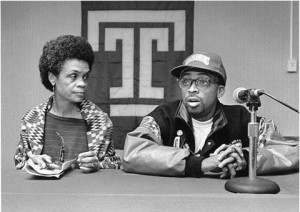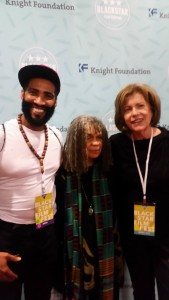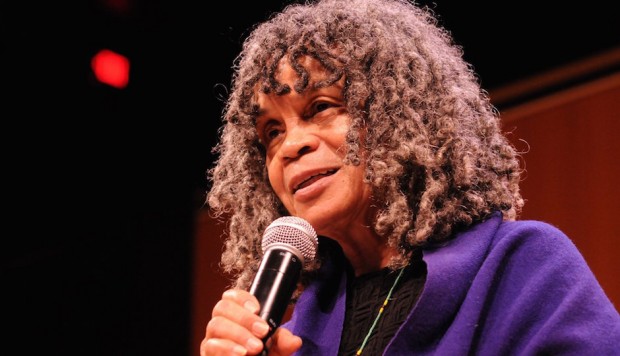BaddDDD Sonia Sanchez
“I get into my room and write for two to three hours easily”, says 81 year old playwright, poet, teacher, activist, and newly renowned film star Sonia Sanchez, who has been aggressively promoting her acclaimed documentary, “BaddDDD Sonia Sanchez”.
She was born in Birmingham, Alabama, but soon after moved to Harlem as a result of the deaths of her mother and grandmother. A graduate of Hunter College, Sanchez never thought she would be getting the kind of recognition and attention she is receiving now. “It’s been a lot of talking and a great deal of traveling, but it has been exciting” she says. But when initially approached about the idea of doing a documentary, she admits she was a bit hesitant. “When I was approached about it, I initially said “I don’t think so” because I had been trained in the civil rights movement. That was not about talking about oneself, it was about the movement…you never celebrate yourself. That’s the first thing we learned. It’s about the movement and people, so you never really talked about yourself.”
Actually, it was Sanchez’s twin sons who convinced her to do the documentary. “They said, you know mom, people really need to know how your generation survived and what you did in answer to the blatant racism that existed. It would be good for young people to see what you did and how you did it. Let them see that it is possible to be an activist and still hold down a job and raise your kids.”
With that as a starting point, Barbara Attie, Janet Goldwater and Sabrina Schmidt Gordon set out to tell the story of “BaddDDD Sonia Sanchez”. “Having seen Sonia Sanchez ‘perform’ her poetry, and experiencing the power of her onstage presence, we knew that she would be an electrifying subject for a documentary,” Attie and Goldwater said in a joint statement. If you’ve ever had the pleasure of seeing her in person or on stage as I have, it would be hard to believe the fact that she says she is really quite shy. “No one believes me when I say I’m shy. They say “Oh no, Sonia I see you on stage, you’re kidding. Well, on stage, I’m not shy, but one on one, it’s a different ballgame.”
Sanchez must admit however, her life sometimes amazes even her. She has published more than a dozen works of poetry, children’s books, and other literature. She was a leader of the Black Arts Movement, the artistic wing of the Black Power movement in the 1960s and ’70s. She is a pioneer of African-American studies. She has clashed with the Black Panthers, been harassed by the FBI (for teaching W.E.B. Du Bois among other “subversives”), arrested at protest gatherings and, after overcoming a childhood stammer, cheered by audiences the world over.
 She is a treasured vessel transferring stories and experiences among us, like the time she confronted Malcolm X after one of his speeches and boldly recalls, “I got right behind him and I tapped him on the shoulder and he turned around and he didn’t see me,” she recalled with a laugh. “And he looked down and smiled, and he said, ‘Yes?’ And I said, ‘Mr. X, I don’t believe everything you said. And he looked at me. He had the most beautiful, quiet eyes of any human being on this earth. And he smiled down, with his eyes, and said, ‘One day, you will, my sister.'”
She is a treasured vessel transferring stories and experiences among us, like the time she confronted Malcolm X after one of his speeches and boldly recalls, “I got right behind him and I tapped him on the shoulder and he turned around and he didn’t see me,” she recalled with a laugh. “And he looked down and smiled, and he said, ‘Yes?’ And I said, ‘Mr. X, I don’t believe everything you said. And he looked at me. He had the most beautiful, quiet eyes of any human being on this earth. And he smiled down, with his eyes, and said, ‘One day, you will, my sister.'”
Language, the use of it, and its’ undeniable power is something that has constantly fascinated Sanchez, who often uses the Yoruba language in her poems. The Yoruba are one of the largest African ethnic groups south of the Sahara Desert. They are, in fact, not a single group, but rather a collection of diverse people bound together by a common language, history, and culture. Within Nigeria, the Yoruba dominate the western part of the country. It has many dialects, but its speakers can all understand each other. It is a tonal language. The same combination of vowels and consonants has different meanings depending on the pitch of the vowels (whether they are pronounced with a high voice or a low voice).
Sanchez sees the poet as a “creator of social values” and the performance as a renewal of ancient rituals: She sings, chants, whispers, clicks her tongue and shouts while reciting her poetry. Sanchez explains why the Yoruba language is important to her, even now. “The slave masters told us to speak English, not Yoruba or any of the other African languages we came here with. They told us to speak English, but they didn’t tell us how to speak English. We couldn’t go to school, so our English came out in a different form which transformed into Black English. It is an amazing form of English when you think about it and hear it. Really, it’s a much richer language than standard English.”
When asked about her process and method of writing she laughs, “I like to write on my porch”, confesses Sanchez. “I sit at my house on my porch with a pot of tea and my newspaper. My daily routine usually consists of me getting out for a morning walk of about three miles. I come back and eat breakfast which usually consists of yogurt, a banana, and green tea. I love to listen to the birds chirping and smell the flowers. I sit and write. People pass by and speak or wave and say “Hey, Ms. Sanchez, or good morning sister Sonia. I don’t mind…those are good interruptions.”
 She also says she prefers to write longhand. “I never liked to use a typewriter. I love that movement between the brain, the eye, and the hand. I like that connection. We have a great history and herstory of writing in this country. We must have writers to continue the tradition of storytelling so that our history, our stories can be not only be told, but heard.” Tradition has an important place according to Sanchez not only in our past, but also in our future. “The next generation must continue to be a part of our tradition. We must make sure that the literature we started in this country continues. We must also be sure to not get away from books. I love holding a book in my hands. To me, a pad or a tablet is so cold. You see words, but you don’t feel them. I want to teach the majesty and the beauty of a book to the next generation. They need to know the importance of that, and what it means. We must preserve the literary tradition.”
She also says she prefers to write longhand. “I never liked to use a typewriter. I love that movement between the brain, the eye, and the hand. I like that connection. We have a great history and herstory of writing in this country. We must have writers to continue the tradition of storytelling so that our history, our stories can be not only be told, but heard.” Tradition has an important place according to Sanchez not only in our past, but also in our future. “The next generation must continue to be a part of our tradition. We must make sure that the literature we started in this country continues. We must also be sure to not get away from books. I love holding a book in my hands. To me, a pad or a tablet is so cold. You see words, but you don’t feel them. I want to teach the majesty and the beauty of a book to the next generation. They need to know the importance of that, and what it means. We must preserve the literary tradition.”
Preserving a rich and priceless tradition is at the forefront of who Sonia Sanchez is and what she stands for. She is a powerhouse of a woman in a small unassuming frame who commands your attention. Listening to her speak is like going to school, church, grandma’s house, and the mountaintop all in one trip. She drops pearls of knowledge and wisdom whenever she opens her mouth to speak, and she is quite clear on what her purpose is. “It was my joy to put us back on a world stage. At one point, all we had was the American slave culture. We were taught that we did nothing, had nothing, and contributed nothing, and as a consequence were nothing. It is up to us to refute that. ”When asked what impact she feels her writings have had, Sanchez replied, “My writings reflect my life and my journey. From one book to the next, you can see where I was in my development as a person and as a writer.”
The 90-minute film ”BaddDDD Sonia Sanchez” includes interviews, archival footage and tributes from such artists as Questlove, Mos Def, Ayana Mathis, Amiri Baraka and Ruby Dee. It can currently be seen on World Channel’s “America ReFramed” series.
To view the trailer for “BaddDDD” and learn more about Sonia Sanchez click here: https://www.youtube.com/watch?v=j7cP6g6VBAY
Darryl Rembert & Erik Humphrey







